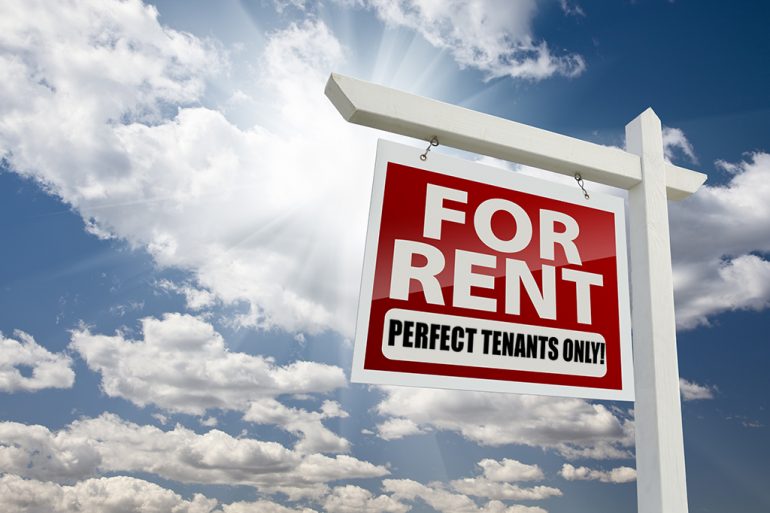How to Find the Perfect Tenant, Even Now!
Do you have an empty rental property in need of a tenant? Are you curious about what it takes to get top-notch tenants in your property — the kind of tenants who take great care of it, pay rent in a timely manner, and rent for the long haul with no plans to break lease early?
Today we are going to delve into the process of finding great tenants. When you rent to the right people, you’ll increase the stability of your rental portfolio and reduce daily stress. And who wouldn’t want that?
Follow the Law
First and foremost, follow the law. This practice comes before everything else. Violating the Fair Housing Act is a serious offense, so be sure you are not discriminating based on the seven protected classes: race, color, national origin, religion, sex, familial status, and disability. The initial purpose of the Fair Housing Act was to prevent discrimination as well as reverse housing segregation, and it is taken seriously throughout the United States. Offenders are prosecuted to the fullest extent of the law.
If you ever question the legality of an idea you have or a question you want to ask a potential renter, ask yourself if you might be violating Fair Housing laws and take the time to do a quick Google search. Do not allow yourself to make a mistake that others have made before you. You may not have the opportunity to continue learning after a misstep of this nature.
It’s crucial to know not only Fair Housing laws but also your local housing laws and ordinances. Stay in compliance! The last thing you want to do is get in trouble with your local city zoning enforcement for having too many people with different last names in a student rental close to the local university. Just because you are unaware of the law doesn’t mean it does not exist, so do your research!
Marketing — Curb Appeal Applies to Renters!
When marketing your property, put your property’s best foot forward. If your property is not attractive and does not draw in good tenants, you will be left with those who are desperate for a rental. These types of tenants likely do not care what condition the property is in nor how it looks.
To excel in the curb appeal arena, spend the money to hire a professional photographer to photograph the property before listing it for rent. It helps to make sure you are happy with how the photos turn out too. Oftentimes, renters will scroll through rental listings and either click on your property, favorite it, or skip it and keep scrolling based solely on the first picture they see.
Pay attention to where you post your rentals. The Thrifty Nickel, local newspaper, and a corrugated plastic yard sign are no longer adequate for attracting high-quality renters. In today’s online world, it’s a numbers game. It’s necessary to list your property on as many syndicated rental listing platforms as possible. Zillow, Trulia, Rent.com, and Zumper are some real estate platforms that allow you to list your rental for very little money and are the first places that renters go when looking for properties.
Is your listing posted on all of these real estate websites? Search Facebook for local groups in your community related to the words “for rent,” “rentals,” “houses for rent,” “for rent by owner,” and other similar words. Request to join all of the aforementioned local groups and post your listing in them as well. Such practice is a great way to not only find local renters but also crowdsource your renting process. Encourage users to tag a friend who would love to live in this home, and you will be surprised at how many people in these local groups engage by tagging friends, commenting on the photos, and asking questions about your rental listing.
Time and time again, landlords have been blown away when they switched over from their traditional marketing techniques and implemented modern strategies including social media and Zillow, especially when they post their professional photos on the listings. Going from sitting on vacant rentals for months at a time to having a stack of highly qualified applicants is every landlord’s dream. It’s possible via modern marketing.
Background and Credit Checks
As part of your application process, run a background check and credit check on your applicants. Platforms such as Zillow make this incredibly easy — it’s part of the $35 application fee that renters pay in order to apply for as many rentals as they want. The site runs a background and credit check on the individual and sends the information your way to review.
The purpose of this background check is to look for any red flags that immediately disqualify potential tenants, such as prior instances of fraud, domestic violence/criminal records, etc. Another significant part of the application process is the credit check and financial background analysis. This is arguably the more important part of the process as it provides you with a window into the financial history of the applicant. It will tell you whether the applicant has had any evictions in the last couple of years or switched jobs and had irregular periods of unemployment consistently.
Using Zillow’s platform for running background and credit checks has saved investors tens of thousands of dollars in lost rent from holdover or bad tenants. Gone are the days of paying third-party services myself to run background and credit checks that do not always catch everything. The built-in features Zillow now offers provide an immense amount of value that saves investors from wasted time, lost rent, and the headaches that come with dealing with unpaid rent and holdover tenants.
Have Rules and a Thorough Application Process
Having as many screening tools as possible in your application process aids in eliminating potential low-quality renters and helps ensure that the remaining applicants are more qualified and more likely to make great tenants. For example, an application fee (even an arbitrary amount of $10) helps to weed out those who are applying to every rental on the market with the hope that one application pans out. This fee guarantees that the applicant is seriously pursuing renting the home.
Outline your rules clearly on your listing, whether you have a strict no partying rule, no smoking rule, no pets rule, or noise restrictions. It’s better to set firm expectations and make them blatantly clear in your rental listing so those who have dogs or are smokers can eliminate the property from their search.
As part of your application process, one of the most important things to request or require are non-familial references. I suggest requesting contact information for former landlords (if the applicant has rented before) from the three previous residences they have lived at.
Take the time to call these former landlords — if appropriate — and do not ask personal questions about the applicant. You can let them know you are considering renting to their former tenant, but you do not want to open yourself up to potential Fair Housing lawsuits. The only question you need to ask is “Would you rent to them again given the chance?”
Posing this question does not put them in a position where they feel pressured to divulge too much information but gives them a simple and easy way to say no if they would not. This is also a great way for them to segue into talking about the good traits the applicant exhibited as a tenant if they would rent to them again.
Protect Yourself
Have a lease agreement signed by both yourself and your tenant that clearly spells out the terms of the lease and outlines the remedies should either party violate any part of the agreement.
If you do not have or want to hire a lawyer to draft lease agreements on your behalf, I highly recommend checking out some online resources. Other real estate investors sometimes offer sample lease agreements that they have used in your state. You can adjust these in a way that works for you and your potential tenants while also protecting yourself and your properties.
Although this may seem obvious, a lease is a crucial component in establishing an effective relationship with your potential tenants and making sure there are clearly defined boundaries/guidelines. Quality tenants have no problem with rules and will thoroughly read the lease before signing to confirm that they can stay in compliance with the requirements.
Having a lease in place can be the difference between spending three months trying to get a bad renter out versus immediately being able to enforce an eviction and get better tenants in. Spend the small amount of time now to save big amounts of time and money later.
Patience Is a Virtue
When searching for great tenants for your rental properties, do not rush to get a signed 12-month lease agreement with the first applicant who comes your way. Screen all potential tenants thoroughly and weigh your options when considering who you want to enter into a legal agreement with.
Jumping in too quickly can result in getting a lease signed on the first day you list your property for rent only to have the lease broken six months in. Waiting an additional week to find the perfect tenant, on the other hand, can get you someone who rents from you for the next four years and always pays rent on time. Good things come to those who wait.
Good Tenants Are Out There — We Promise!
The most important things to consider when seeking the best tenants for your rental properties are following the law (this goes above all else), top-notch marketing, implementing background checks and credit checks, having rules and a thorough application process, protecting yourself with a lease, and being patient.
By implementing these screening processes, finding great tenants for your rentals will no longer be a stressful period of time that you dread but an opportunity for continued improvement of tenant quality. It will be a time when you can find great new tenants who will take care of your properties and provide you with more reliable income.
Study up on these practices so that you will be fully prepared the next time you need to find tenants for one of your properties. The process will be a rewarding one!








